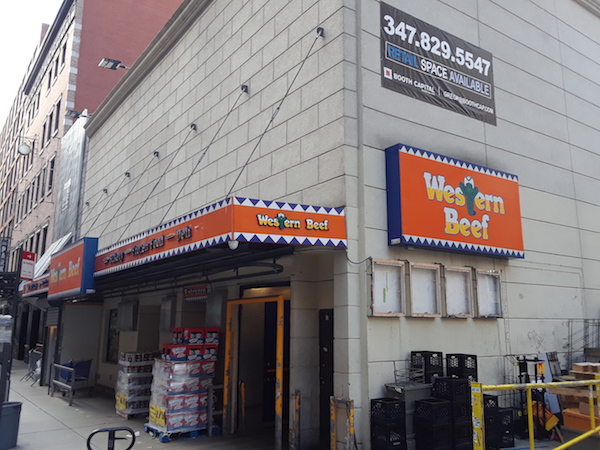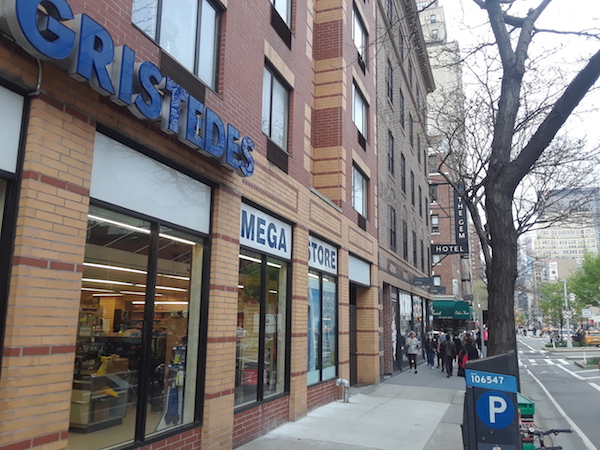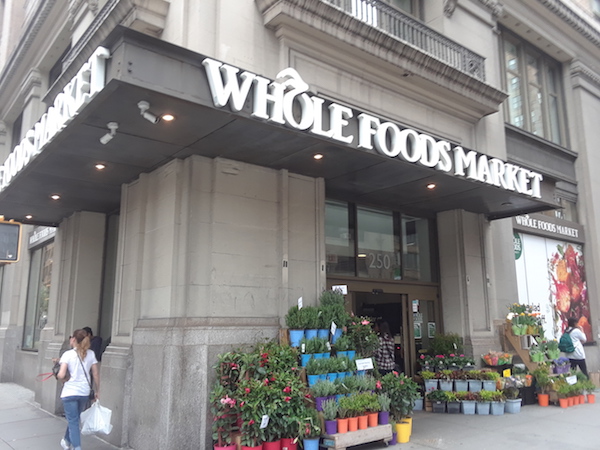Use Ebt for Western Beef Direct

BY WINNIE McCROY | The community is abuzz this week over the possible shuttering of yet another affordable grocery store in the growing food desert that is Chelsea. Faced with diminishing inventory on the shelves and the quiet removal of the majority of shopping baskets and carts, locals believe that the Western Beef (431 W. 16th St. btw. 9th & 10th Aves.) is preparing to close up shop.
"Word is spreading, especially among those in Fulton Houses, that it might close," said Italo Medelius, a community activist focused on food access, through a subcommittee of the Hudson Guild Neighborhood Advisory Committee.
"The majority of folks there shop at Western Beef… because it's one of the last affordable grocery stores in the neighborhood," Medelius noted, adding, "This is really the last straw."
Miguel Acevedo, president of the Fulton Houses Tenants Association, told Chelsea Community News, "I spoke to the main manager, Victor, who runs the whole operation, and he said that a few months ago, the adjacent High Line Ballroom tenants left because they refused to keep rent increases at a fair market rate. They said they are leasing that property—hopefully only the area that housed the High Line Ballroom—but according to conversations among people in the neighborhood, they have been hearing from employees that the store is closing."
Chelsea Community News reached out to the manager of Western Beef, who said that while "customers are saying we are closing, it's just a rumor."
But residents of Flushing, Queens faced a similar dilemma in August 2018 when the Western Beef at 44-44 College Point Boulevard closed with no previous notice. The Flushing storefront was the one of the oldest stores of the holding company, Cactus Holding 44-44 Point LLC, but a representative of the company said the building had become too high maintenance and inefficient to maintain. Employees were reportedly transferred to other locations.
"We asked them if they are selling or closing down the grocery store, but the managers wouldn't commit to anything," said Miguel Acevedo, head of the Fulton Houses Tenants Association. "But when you walk in, where there used to be a stack of 50 shopping baskets, there are now zero baskets there. The merchandise is leaving the shelves, and there are only 10 shopping carts, where before there were 50. The stock is diminishing; slowly but surely, they are eliminating everything. And they only keep two registers open now. But still, they say nothing is going to happen, that they are just leasing the upstairs."
Acevedo, who has lived in nearby Fulton Houses for his entire life, has faced this situation before. In 2006, he worked with local politicians to help moved Western Beef from its sprawling location on W. 14th St. to its current, much smaller location on W. 16th. Still, if the supermarket ends up leaving for good, Acevedo wants to have a Plan B ready for the tenants.
"I said, 'Look Victor, tell me the truth, because I need to prepare my people and talk to the electeds to find a replacement.' I have already reached out to the former owners of an East Village supermarket who said they would need 4,000 square feet to move to Chelsea," Acevedo said. "They maintain that the only thing to be leased is the property upstairs, that they are not doing anything to Western Beef and that they have no idea why people say they are closing down on June 1. But if someone offers these guys enough money to buy the whole building, who is to say they won't sell?"

No Place for WIC, SNAP
Chelsea is already hurting for affordable groceries stores. In 2016, the Associated supermarket at 255 W. 14th St. and Eighth Ave. was forced out by a massive rent hike. This made a huge impact on locals, especially seniors and the disabled, plus those relying on WIC (Women, Infants, and Children) or SNAP (Supplemental Nutrition Assistance Program) assistance for their groceries.
That was followed by the August 2017 closing of Garden of Eden grocery store, at 162 W. 23rd St. (btw. Sixth and Seventh Aves.). The residents of Penn South were chagrined by the closing, as the store offered healthy options at a cheaper price than boutique outlets like Whole Foods. (In early May, Westside Market, which has a store on Seventh. Ave. and W. 15th St., plans to set up shop in the former Garden of Eden space.)
For now, though, customers must turn to Trader Joe's, (675 Sixth Ave. at W. 21st St.) or the Whole Foods (250 Seventh Ave. at W. 24th St.). Wealthier New Yorkers might just turn to one of the many home delivery systems like SunBasket, Blue Apron, or Fresh Direct. Or they might reconcile to the higher cost of groceries at Whole Food or Gristedes. But for those low-income residents who rely on SNAP or WIC checks to feed their family, the closing of Western Beef presents a serious blow, especially because these high-end grocery stores will not accept these government vouchers.
At the time, Gristedes owner John Catsimatidis, in an article about WIC published by Chelsea Now (whose website archives are now merged with The Villager), urged protestors to turn their attention to the state, saying they should, "petition the state to do the right thing. Petition the state to pay the right price," and noting the Department of Health would only reimburse vendors the set average price of items, which does not take into account this high Manhattan rents that increase costs. Catsimatidis also said that the blank paper checks issued as WIC checks were bouncing, to the tune of about 700 per month.
"The state is trying to move away from using written checks for WIC, which is half the problem why grocery stores won't accept them," said Medelius. "If this Western Beef closes, there will be only three stores left that accept WIC and SNAP from 14th Street all the way up to 59th Street," he noted. "That means people in Fulton Houses will need to travel all the way up to Hell's Kitchen to use their WIC benefits."
In August 2017, Medelius was involved with a campaign to try and get Gristedes to accept WIC checks, the supplemental nutrition program that helps provide baby formula, milk, and produce to low-income women and their small children. The campaign brought other issues to the forefront that the general public may have overlooked: how this affects the elderly and the disabled.
"While we were doing that campaign to get Gristedes to take WIC, we discovered the great impact this had on disabled moms, moms with disabled kids, and those who can't easily travel to stores in Hell's Kitchen instead. For them, it is going to be such an added burden to not be able to use their WIC voucher," Medelius said.
New York's affordability crisis isn't just about the skyrocketing cost of rent—it's also about access to affordable food and produce, Senator Brad Hoylman said.
"Western Beef is one of the only affordable supermarkets in the Chelsea area that accepts WIC, and its potential closure would be an enormous loss for families across my district who are struggling to make ends meet," Hoylman added.

Hard Times for Retail As Well
Gentrification in Chelsea has resulted in skyrocketing real estate costs that affect not only tenants, but retail owners as well. Ken Jockers, Executive Director of The Hudson Guild (441 W. 26th St.), has worked on the issue of food deserts for years, but also has a sympathetic eye toward the pressure this puts on retail services. Landlords can get higher rent on residential apartments, allowing them to leave street level commercial space unoccupied for longer periods of time while they seek higher rents. The pressure intensifies on families, especially those with smaller incomes, and is a reason why Hudson Guild is fighting for solutions to make the neighborhood accessible for all community members.
"It is no secret that affordable street-level retail options, including grocery stores, have gotten harder to find as more and more luxury level services and stores have moved in, and that makes it harder for people on limited incomes to get their basic needs met," Jockers observed. "The result is, people end up taking a bus or train to New Jersey to buy food, because it's a better deal than shopping in the neighborhood. That's true of food stores, and things like laundromats and other basic services and supplies that people need just to live their lives."
There's a place for luxury services, Jockers said, but not at the expense of grocery store owners, whose ability to operate a store offering less expensive products gets harder and harder as rents get higher on commercial spaces. Still, Jockers recalls how Western Beef made the decision more than a decade ago to work with community activists and stay in the neighborhood.
"We understand that they have got to be able to sustain their business, and part of that is having a rent that is manageable," Jockers said. "I know that making your rent is a major commitment and puts a lot of pressure on a business owner, and that means higher prices, which means pressure on residents."
Still, having an affordable grocery store within four or five blocks of one's home is a necessity, especially for seniors who cannot tote heavy bags of groceries for long distances. These activists vow to work with elected officials to ensure that Chelsea has a grocery store that can turn a profit while still offering good deals to their customers.
"No one can say that Western Beef is not making a profit," Acevedo said. "They are a profitable business, they can't say they're not making money, and they are providing a great service to the residents of Fulton Houses. But if we lose Western Beef, we are dead. A lot of people will go without food."
City Council Speaker Corey Johnson, Assemblymember Richard Gottfried, Congressman Jerrold Nadler, Manhattan Borough President Gale Brewer, and Sen. Hoylman penned an April 22 letter to Peter Castellana Jr., CEO of Western Beef Retail Inc., urging a meeting to "discuss the plans for this grocery store and explore what assistance we may be able to offer to help ensure this location remains open."
"The last time our community was threatened with the closure of Western Beef, we rallied and managed to keep a relocated store in business," Hoylman recalled, adding, "I am hopeful we can find a path forward this year, too. I will be working with fellow elected officials over the coming months to protect access to affordable food, and to urge Western Beef to continue providing its valuable services to our community."
Chelsea Community News is made possible with the help of our awesome advertisers, and the support of our readers. If you like what you see, please consider taking part in our GoFundMe fundraiser (click here). To make a direct donation and/or send feedback about the site, send an email to Scott@chelseacommunitynews.com.
Source: https://chelseacommunitynews.com/2019/04/21/closing-of-western-beef-would-leave-chelsea-a-food-desert/
0 Response to "Use Ebt for Western Beef Direct"
Postar um comentário